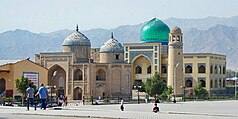Sughd Province (Tajik: Вилояти Суғд, romanized: Viloyati Sughd, lit. 'Sogdia Region'; Persian: ولایت سغد) is one of the four administrative divisions and one of the three provinces (Tajik: вилоятҳо, romanized: viloyatho; Persian: ولایت) that make up Tajikistan. Centered in the historical Sogdiana, it is located in the northwest of the country, with an area of some 25,400 square kilometers and a population of 2,707,300 (2020 estimate),[1] up from 2,233,550 according to the 2010 census and 1,871,979 in 2000. The capital is Khujand. The Province's ethnic composition in 2010 was 84% Tajik, 14.8% Uzbek, 0.6% Kyrgyz, 0.4% Russian and 0.1% Tatar.[4]
Sughd Province
Вилояти Суғд (in Tajik) Согдийская область (in Russian) | |
|---|---|
From the top to bottom-right, Khujand, Panjakent District, Rudaki's Tomb, Ayni District, Yaghnob River | |
 Sughd in Tajikistan | |
| Coordinates: 39°30′N 69°0′E / 39.500°N 69.000°E | |
| Country | |
| Capital | Khujand |
| Area | |
| • Total | 25,200 km2 (9,700 sq mi) |
| Population (2020)[1] | |
| • Total | 2,707,300 |
| • Density | 110/km2 (280/sq mi) |
| ISO 3166 code | TJ-SU |
| HDI (2017) | 0.659[2] medium |
| Official languages | |
The province shares a border with the Jizzakh, Namangan, Samarkand and Fergana regions of Uzbekistan, and the Osh and Batken regions of Kyrgyzstan. The Syr Darya river flows through it. It contains the Akash Massif and Mogoltau Massif Important Bird Areas. Sughd is separated from the rest of Tajikistan by the Gissar Range (passes may be closed in winter). The southern part of the region is the east-west valley of the upper Zarafshan River. North, over the Turkestan Range, is the Ferghana Valley. The region has 29% of Tajikistan's population[1] and one-third of its arable land.[5] It produces two-thirds of the country's GDP.[6]
Economy edit
The economy of Sughd has been growing steadily since 2000, at the average rate of 13.2% in 2008 and 13.3% in 2009.[7] In 2009, farming, trade and industrial production contributed 28.2%, 25.8% and 14.0% to the GRP (gross regional product) of Sughd, respectively.[7] Since 2000, the output of industrial production increased two-fold, at an average annual growth rate of 5–8%.[7]
A free economic zone has been established in the region called Sughd Free Economic Zone.
Demographics edit
| Year | Pop. | ±% p.a. | |
|---|---|---|---|
| 1979 | 1,194,683 | — | |
| 1989 | 1,558,158 | +2.69% | |
| 1999 | 1,871,979 | +1.85% | |
| 2010 | 2,233,550 | +1.62% | |
| 2020 | 2,707,300 | +1.94% | |
| |||
| Source: Citypopulation[8] | |||
Cities edit
Sughd province counts the following 8 district-level cities (with population estimate as of 2020):[1]
Districts edit
The province is divided into 10 districts (Tajik: ноҳия, nohiya or Russian: район, raion). Furthermore, several cities (shahr) also cover other towns (shahrak) and rural localities. These are listed under "city districts".[1]
Districts of Sughd edit
- Asht District
- Ayni District
- Devashtich District
- Ghafurov District
- Kuhistoni Mastchoh District
- Mastchoh District
- Spitamen District
- Jabbor Rasulov District
- Shahriston District
- Zafarobod District
City districts edit
See also edit
References edit
- ^ a b c d e "Population of the Republic of Tajikistan as of 1 January 2020" (PDF) (in Russian). Statistics office of Tajikistan. Retrieved 2 October 2020.
- ^ "Sub-national HDI - Area Database - Global Data Lab". hdi.globaldatalab.org. Retrieved 2018-09-13.
- ^ "КОНСТИТУЦИЯ РЕСПУБЛИКИ ТАДЖИКИСТАН". prokuratura.tj. Parliament of Tajikistan. Retrieved 9 January 2020.
- ^ "CensusInfo - Data". www.censusinfo.tj. Retrieved 2019-09-09.
- ^ Agriculture of the Republic of Tajikistan, statistical yearbook,State Statistical Committee, Dushanbe, 2008
- ^ Robert Middleton and Huw Thomas, 'Tajikistan and the High Pamirs', Odyssey Books, 2008, page 166
- ^ a b c Socio-economic situation of the Sughd oblast, Statistics Committee of Sughd oblast, Khujand: January–March 2010 (in Tajik and Russian)
- ^ "Tajikistan: Provinces". www.citypopulation.de.
Further reading edit
- Hamilton Alexander Rosskeen Gibb (2007). The Arab Conquests in Central Asia. Read Books. ISBN 978-1-4067-5239-7. reprinted from the 1923 edition, published by the Royal Asiatic Society OCLC 474026895.
- Le Strange, Guy (1905). The Lands of the Eastern Caliphate: Mesopotamia, Persia, and Central Asia, from the Moslem Conquest to the Time of Timur. New York: Barnes & Noble, Inc. OCLC 1044046.




